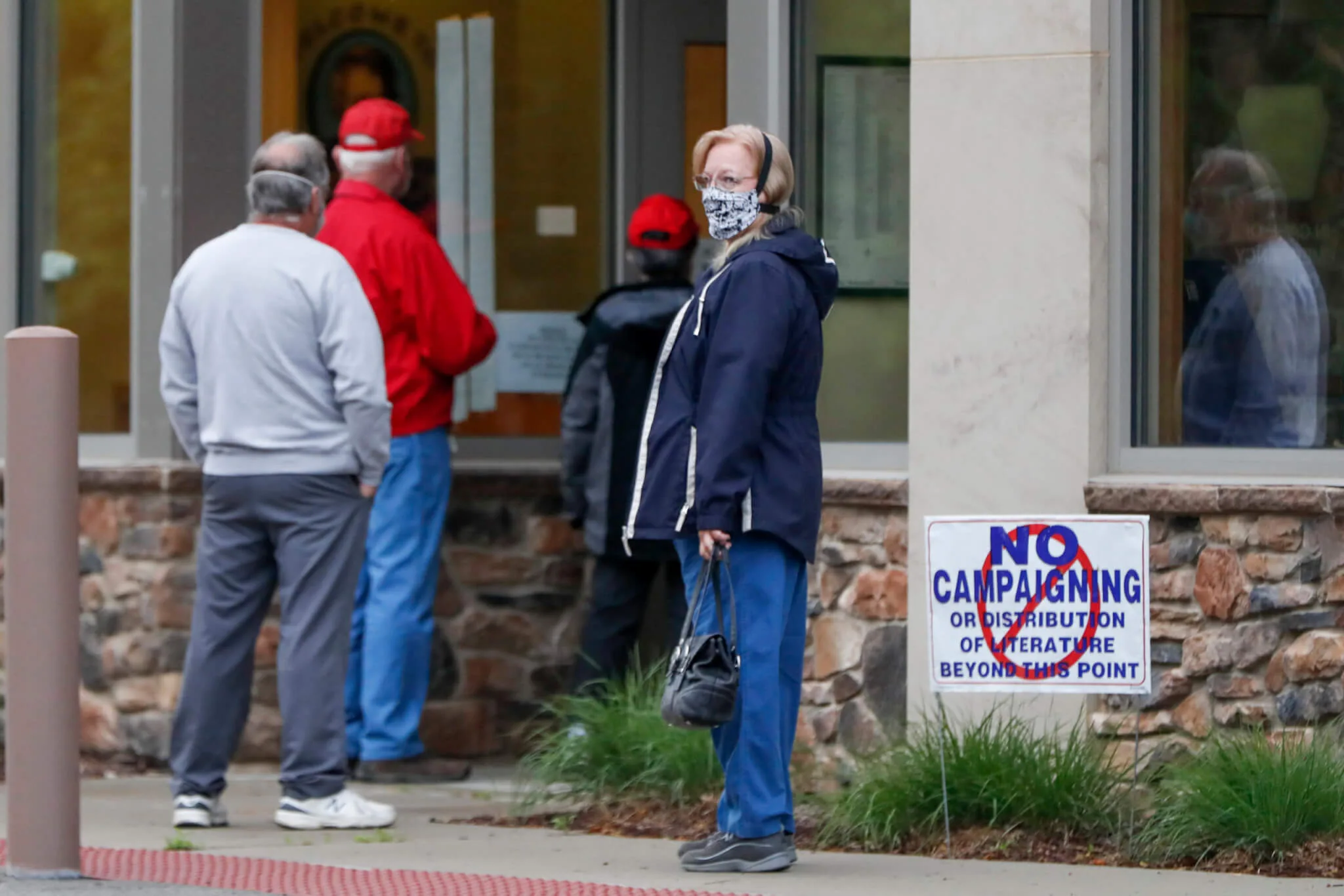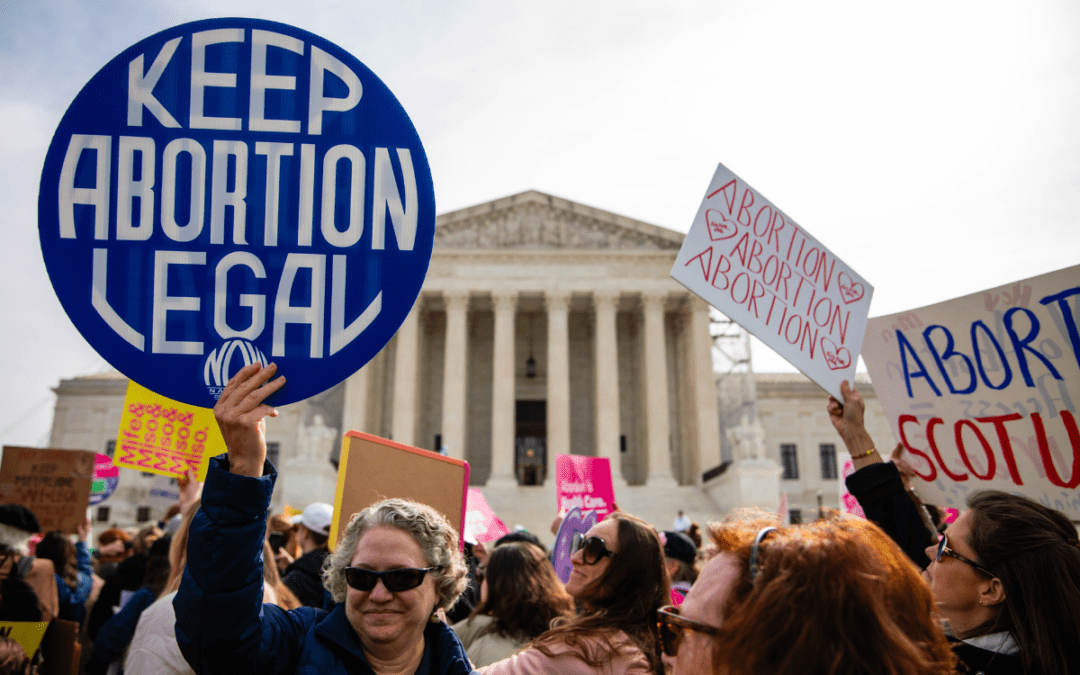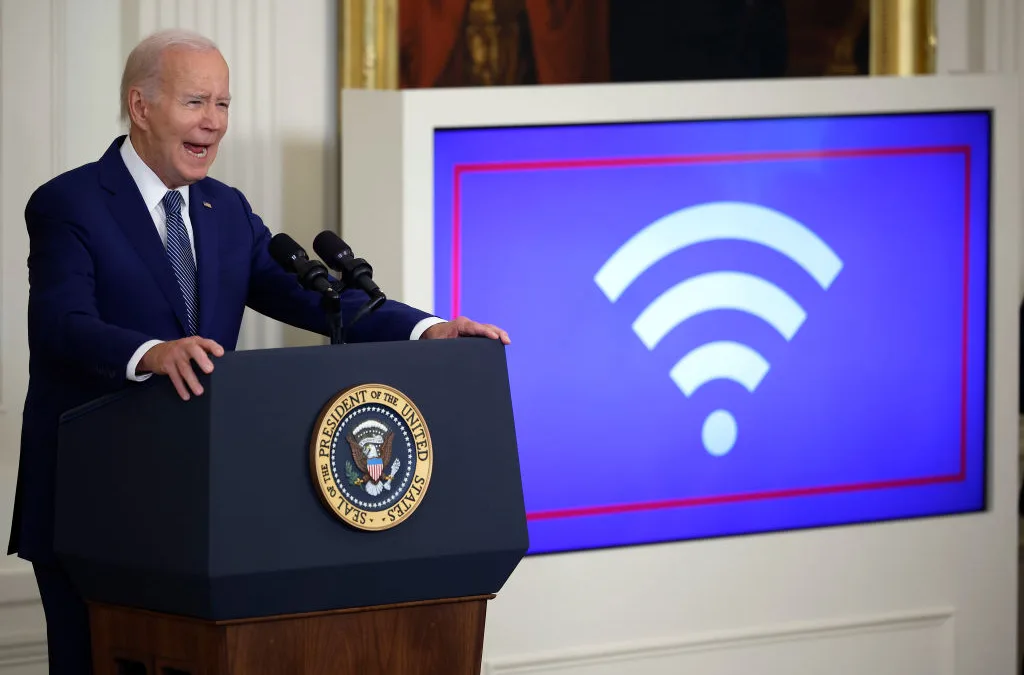
People wait outside their voting place before the polls open for the Pennsylvania Primary election, Tuesday, June 2, 2020, in Zelienople, Pa. (AP Photo/Keith Srakocic)
“No one will be intimidated or be impeded to vote. We expect a peaceful and successful election.”
With a recent report naming Pennsylvania one of five states at high risk of intimidation and violence from far-right and white supremacist groups, officials across the state are making plans to keep the peace at the polls on Election Day.
“We must ensure all eligible votes are counted. This historic collaboration between local and state agencies gives us the ability to ensure a free, fair and secure election process,” Pennsylvania Attorney General Josh Shapiro said in a news release.
“Interference, intimidation, and fraud undermines that ability and we will not stand for it.”
The FBI, state Department of State, state Office of the Attorney General, state Office of the Inspector General, Pennsylvania Emergency Management Agency, Pennsylvania State Police, the Governor’s Office of Homeland Security, the Pennsylvania National Guard, local county and municipal elections officials, and local county and municipal police are all working together, the news release said. They are monitoring all available communications channels to keep track of where white supremacist groups are planning to go, and embedding state officials in those areas.
And they are prepared to arrest and prosecute anyone who attempts to interfere with the electoral process.
RELATED: What Can Go Wrong at the Polls and What You Can Do About It
“No one will be intimidated or be impeded to vote,” said Fred Harran, director of public safety in Bensalem, Bucks County. “We expect a peaceful and successful election.”
Concerns About Violence Around the Election
The number of hate groups in the US has climbed steadily since 2014, reaching a record high of 1,020 in 2018. This was after three years of a steady decline in the number of hate groups.
The number of hate crimes in the US also has increased steadily since 2015, reaching a record high in 2018. And while crimes against property (vandalism, graffitti) were down, physical assaults were up, accounting for 61% of the 7,120 incidents classified as hate crimes by law enforcement officials who reported the data to the FBI.
Some have blamed President Donald Trump—his policies and his rhetoric—for the growth of white supremacist groups.
Concerns about violence around the election also rose when Trump failed to denounce white supremacist groups during the first presidential debate with Democratic candidate Joe Biden in September. Trump said, “Proud Boys, stand back, and stand by. But I’ll tell you what, I’ll tell you what, somebody’s gotta do something about antifa and the Left.”
Members of the Proud Boys, a white supremacist group, took Trump’s words as a call to arms. Some even made Trump’s words part of their logo.
About a week after the first presidential debate, the US Department of Homeland Security and the FBI released a report identifying violent far-right and white supremacist groups as “the most persistent and lethal threat in the homeland.”
RELATED: Right-Wing Extremists Are a Very Real Threat to America
While individual anti-government and white supremacist groups traditionally have been competitive with one another and not inclined to work together, they have in recent years realigned “to mostly supporting one candidate, thereby generally positioning the militia movement with a political party,” according to a report from the Armed Conflict Location and Event Data Project (ACLED) and MilitiaWatch.
These groups now “pose a serious threat to the safety and security of American voters,” the report says.
ACLED and MilitiaWatch have been tracking more than 80 far-right and white supremacist groups across the US. They have “become more assertive” in recent months, the report says, “with activities ranging from intervening in protests to organizing kidnapping plots targeting elected officials.”
ACLED and MilitiaWatch believe that voters in state capitals, small cities, and suburban areas in Pennsylvania, Georgia, Michigan, Wisconsin, and Oregon are at the highest risk of intimidation and violent activity from far-right and white supremacist groups.
Kierran Young, a Western Pennsylvania organizer for the Black Voters Matter Fund, said the organization is “genuinely fearful” that far-right and white supremacist groups from Western Pennsylvania, West Virginia, and Ohio will attempt to intimidate Black voters at the polls.
RELATED: Young Black Voters Could Be the Key to Biden Winning It All
“There are a lot of armed groups in the area [and] the Klan is extremely active in Western Pennsylvania,” Young said. “I’ve seen them flyering the community recently, trying to drum up support. The Proud Boys are passing out fliers and I can only imagine what they are talking about at those meetings. I do think that these groups are a threat and they need to be monitored.”
Young, who is in his 20s, said he has heard more concerns from older generations.
“That also is a product of what that particular portion of our community has lived through—that fear,” he said.
Young said his group had been advising people to apply for mail-in ballots and vote early, but that is no longer an option. Now, he said, “We need to be prepared by coordinating with law enforcement and making sure we have our own security.”
Officials’ Plans to Keep the Peace
In the midst of protests in Philadelphia after the police shooting of Walter Wallace Jr., Philadelphia District Attorney Larry Krasner issued a strong rebuke of Trump and the far-right and white supremacist groups that follow him.
“The Trump Administration’s efforts to suppress votes amid a global pandemic fueled by their disregard for human life will not be tolerated in the birthplace of American democracy. Philadelphians from a diversity of political opinions believe strongly in the rule of law, in fair and free elections, and in a democratic system of government. We will not be cowed or ruled by a lawless, power-hungry despot. Some folks learned that the hard way in the 1700s,” Krasner said.
“The Philadelphia District Attorney’s Office continues to work with our partners in law enforcement and government to ensure every voter gets to vote and that every vote is counted. Keep your Proud Boys, goon squads, and uncertified ‘poll watchers’ out of our city, Mr. President. Break the law here, and I’ve got something for you.”
Officials in some parts of the state said voters should not bring firearms to the polls, and said doing so could be considered voter intimidation.
Others, like Pocono Mountain Regional Police Chief Christopher Wagner, noted that there is nothing in the state’s election code that specifically prohibits a voter from bringing a gun to their polling place. However, he said, “voters must still be aware that the crimes code prohibitions still apply to restricted areas, such as schools and courthouses.”
Police are not allowed within 100 feet of a polling place on Election Day unless they are voting or have been summoned by a judge of elections to address a specific problem, but officials said officers across the state will be ready when called.
In Philadelphia, the state’s largest city, assistant district attorneys will be embedded with commanders in the police department, so the police have immediate access to their expertise, city spokesperson Lauren Cox said.
“Similar arrangements are being discussed with the US Attorney’s Office and the FBI. Both of those federal partners anticipate an enhanced presence on Election Day,” Cox said.
The DA’s office has counseled the force to ensure “that officers are clear on what activity might represent potential election violations or First Amendment violations should they be called to a polling location,” she said.
Officials in Pittsburgh are working with state and federal officials to coordinate their response if there is an incident at the polls, said Cara Cruz, spokesperson for the Pittsburgh Public Safety department.
Cruz did not provide specific details about the city’s plans, but said police will work 12-hour shifts through Nov. 8.
Wagner said his department, which covers five municipalities in Monroe County, will have additional officers on duty and specialized officers ready to assist patrol officers.
RELATED: The 2020 Election Could Be the Most Secure Ever, Experts Say
Politics

How Project 2025 aims to ban abortion in Pennsylvania
Former president Donald Trump said abortion was a state’s rights issue recently, but conservative organizations, under the banner “Project 2025,”...

736,000 PA households could lose crucial help on their internet bills
Time is running out for the Affordable Connectivity Program, which provides low-cost high speed internet access for over 736,000 Pennsylvania...

What to know about Trump’s legal issues
Over the past year, former president Donald Trump has become the center of not one, not two, not three, but four criminal investigations, at both...
Local News

Conjoined twins from Berks County die at age 62
Conjoined twins Lori and George Schappell, who pursued separate careers, interests and relationships during lives that defied medical expectations,...

Railroad agrees to $600 million settlement for fiery Ohio derailment, residents fear it’s not enough
Norfolk Southern has agreed to pay $600 million in a class-action lawsuit settlement for a fiery train derailment in February 2023 in eastern Ohio,...





